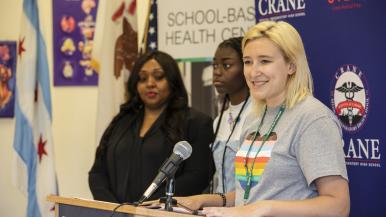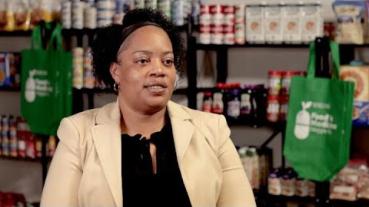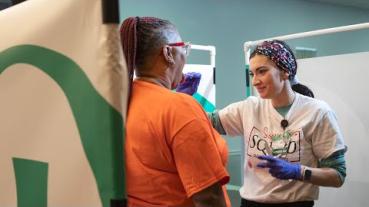In its first four years, the HEAL anti-violence initiative has supported tens of thousands of Chicagoans in underserved neighborhoods with economic, community, medical and mental health services, U.S. Sen. Richard Durbin said. He commended the work of RUSH and the other nine Chicago hospitals that came together to form the HEAL initiative. Durbin shared many of the program’s successes while also announcing $6.5 million in new federal funding to expand those services.
Durbin made the announcement at Richard T. Crane Medical Preparatory High School, where he toured RUSH’s school-based health center and listened to the clinical, social work and community health staff who care for students there, as well as students and school staff.
Newly graduated Crane student Shanya Johnson spoke on how the center’s staff helped her get the school physicals she needed, provided counseling that guided her through a difficult senior year and taught her exercises to help her during difficult situations.
“They helped me so much throughout my senior year, which has been my most stressful year in high school,” Johnson said, adding the year “was kind of rocky,” and asking for help was not easy. “Just knowing the RUSH clinic was here, and the staff was so friendly, and with all they’ve offered me and the help they’ve given me through the years, it’s been amazing.”
The additional HEAL funding Durbin announced includes $1.5 million that will allow RUSH and UI Health to expand mental health services for students like Shanya and their families. With additional social workers and community health care workers, the school-based centers can better serve students but also more deeply engage with parents, teachers and the community.
“This will allow us to do more to address the impact trauma has had on the communities we serve,” said Kathleen Smith, LCSW, manager of social work services for RUSH school-based health centers. “We sit with the pain that our students and their families have experienced and work with them to identify their strengths and build their resilience.”
RUSH’s five school-based centers — at Crane, Orr Academy High School/KIPP One elementary program, Simpson Academy, Dunbar Vocational Career Academy and Wendell Phillips Academy — provide care that varies from managing chronic conditions, such as asthma to offering immunizations and school and sports physicals, as well as prenatal care, mental health support and much more, Smith said.
“We see the difference the centers make for students and their families,” Smith added. “We are incredibly grateful to you, Sen. Durbin, for your continued support of the HEAL initiative, which has intentionally invested in historically underserved communities, including here on the West Side.”
Durbin shared the report on the first four years of the HEAL program, highlighting what the 10 hospitals were able to achieve in addressing community violence prevention, health disparities, trauma and mental health services, local hiring, procurement and workforce development.
For example, RUSH hired an additional 388 employees from HEAL communities last year — a 55% increase from 2021. In addition, RUSH hosted 185 high school and college interns last year in its pipeline education programs. Of those interns, more than three-quarters earned industry-recognized credentials in allied health or information technology, putting them on a path to greater economic mobility.
“This report showcases the transformative efforts of our health care institutions, reaching beyond their walls to engage communities and build partnerships,” Durbin said. “Together, we are forging a path towards lasting change — not just in Chicago, but as a beacon of hope for our entire nation.”
Among their achievements, the 10 HEAL health systems collectively:
- Hired 5,390 new employees from the 18 focus neighborhoods.
- Provided 3,639 students with summer job, pipeline, or apprenticeship programs.
- Operated 24 school-based health clinics and mobile health units that served 11,277 students.
- Served 17,623 individuals with violence recovery programs, including 3,028 victims with ongoing trauma-informed case management services.
In addition to RUSH, the other hospitals initially involved in Chicago HEAL are: Advocate Health, Ascension Saints Mary and Elizabeth Medical Center, Ann and Robert H. Lurie Children’s Hospital, Cook County Health and Hospital System, Loyola University Medical Center; Northwestern Memorial Hospital, Sinai Health System, University of Chicago Medical Center and University of Illinois Hospital and Health Sciences Systems.




